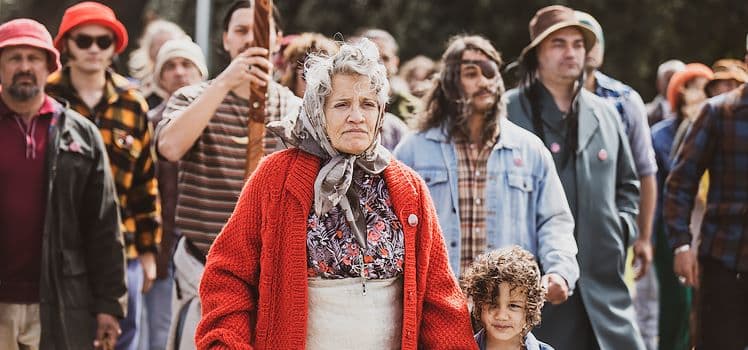Between March 12 and April 6, 1930, the world’s media contained daily reports of an Indian protest march from the Sabarmati ashram to Dandi on Gujarat’s western coast.
Led by Mahatma Gandhi, it became the symbolic start of anti-colonial resistance using non-violent methods. The “salt march” was one of the central events in Gandhi (1982). Some 22 years later, Selma depicted protest marches in America’s Deep South, led by Martin Luther King in 1965.
Now New Zealand has its own dramatisation of the Māori land march of 1975 which, like those other two, recorded positive social change. The salt march lasted 24 days and covered 385km. Selma to Montgomery, the state capital of Alabama, is just 87km. But the North Island hikoi (Te Roopu O’Te Matakite) was 1000km and lasted a month, from September 13 to October 14.
Whina (Transmission) follows two earlier documentaries, and a biography by Michael King, and presents the life of Dame Whina Cooper in a way that loses nothing in its impact, compared with the two big budget movies.
The acting by a professional cast, direction by James Napier Robertson (The Dark Horse) and Paula Whetu Jones, and the photography by Leon Narbey, are excellent. Given a rich background of personal incidents, controversial political events, and a climax involving 5000 marchers in Wellington, it would be surprising if this wasn’t achieved.
Born Hōhepine (Josephine) Te Wake into a Catholic family, Whina’s precocious talents were enhanced by attending St Joseph’s Māori Girls’ College in Napier from 1907. On returning, she ran the co-op store at Panguru in the Hokianga, and taught at a local school. She was also a housekeeper at the Rawene presbytery.
An early sign of her activist career was a protest over plans to drain mudflats, followed by marriage to surveyor Richard Gilbert (Richard Te Are) without community approval. They moved away, but returned after a Catholic priest provided funds for them to buy the family farm and store.
In a protest at being unable to speak on a marae, Whina (Miriama McDowell) built a parish hall, while embarking on land development schemes. A scandal ensued when she became pregnant to a land officer, Bill Cooper, whom she married after Gilbert’s death in 1935.
This marriage was not official until 1941 after Cooper (Vinnie Bennett) was divorced and converted to Catholicism. The rift with the community lasted until his death in 1949, forcing Whina and her children to leave for Auckland in 1951.
These events are told in rapid succession as the then middle-aged Whina continued her campaigns, which included the founding of the Māori Women’s Welfare League. By 1956, it had 300 branches throughout the country, with Whina using her forceful “let’s do it” manner rather than waiting for a consensus.
Whina (played in her older years by Rena Owen) gave up public life in 1974, moving back to Panguru, but that lasted just a year before she was asked to lead the hikoi, aged 80. It’s a compelling tale, often told through flashbacks, and packing a lot of detail into its running time.
Rating: Parental guidance advised. 115 minutes.

Reader Interactions